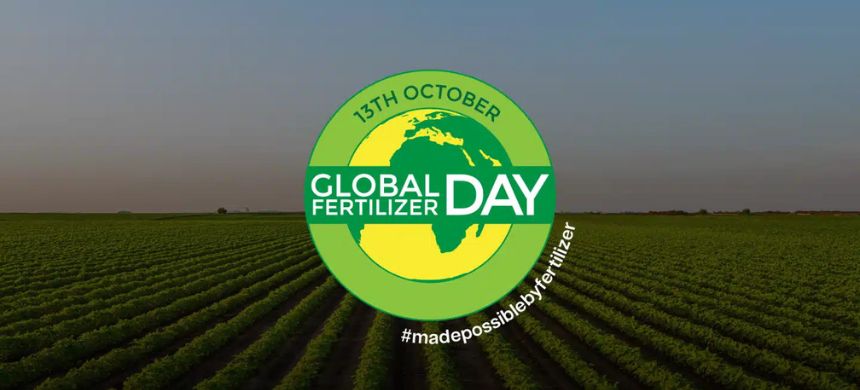Fertilizers serve as the silent champions of agriculture, enabling the production of enough food to sustain billions. Celebrated annually on October 13th, Global Fertilizer Day highlights the crucial role fertilizers play in modern farming.
The Backbone of Agricultural Productivity
Fertilizers are essential for agricultural productivity, providing vital nutrients that plants require for growth. They significantly enhance crop yields and improve produce quality. By promoting sustainable farming practices, fertilizers are integral to the stability and productivity of global food systems, making them vital for food security.
Read more: Engro Fertilizers launches UgAi App to Benefit Farmers with Direct Purchasing, Advanced Technologies
However, these benefits can only be realized when fertilizers are used responsibly. Over-application or improper use can lead to severe environmental consequences. ICL is committed to offering efficient fertilizers and guidance on appropriate fertilization methods to promote responsible use and minimize environmental impacts.
ICL Group: Pioneering Sustainable Solutions
ICL Group is a leading player in the fertilizer sector, recognized for its innovative and sustainable solutions. The company approaches plant nutrition through cutting-edge research and innovation, developing new fertilizers, biostimulants, nutrient recycling methods, and precision farming techniques. These efforts aim to maximize nutrient efficiency while minimizing environmental impact.
ICL’s initiatives have not only increased agricultural productivity but also significantly advanced sustainability goals. Innovative products such as eqo.x®, a controlled-release fertilizer with a biodegradable coating, Polysulphate—a natural fertilizer with four nutrients and a low carbon footprint, Puraloop—a recycled phosphorus fertilizer, and NovaHumic—water-soluble fertilizers enriched with humic acids exemplify ICL’s commitment to R&D and agronomy.
With a dedication to sustainable agricultural practices, ICL is leading the way in developing next-generation fertilizers and solutions that enhance crop yields, promote soil health, and protect the environment. Through ongoing research and development, ICL ensures that farmers worldwide have access to the best tools for feeding the planet.
Exploring the History of Fertilizer Technology
The use of fertilizers dates back to ancient civilizations, where farmers utilized organic materials such as manure, compost, and ashes to enrich their soils. These early practices laid the foundation for modern fertilizers, marking a significant milestone in agricultural history.
In the 19th century, British economist Thomas Malthus warned of impending food shortages due to population growth, but advancements in agricultural technology proved him wrong. Improvements in farming practices, such as efficient land use, better machinery, crop rotation, and crucially, the introduction of fertilizers, transformed agriculture.
The development of chemical fertilizers in the 19th century marked another pivotal moment. Innovators like Justus von Liebig and Fritz Haber pioneered synthetic fertilizers, which have become essential in modern agriculture. The ongoing adoption of these technologies has turned traditional farming into a robust global industry. However, the responsible management of fertilizers remains critical to mitigate environmental impacts like nutrient leaching and volatilization.
One key advancement in the fertilizer industry is Controlled-Release Fertilizers (CRFs), designed to release nutrients gradually according to crop needs. This technology enhances nutrient efficiency, reduces environmental impact, and improves crop performance. ICL’s Osmocote, the world’s first coated fertilizer, remains a leader in horticulture.
Fertilizers: Feeding a Growing World
“Soil and water provide the foundation for food production, ecosystems, and human well-being. Continuous farming without replenishing nutrients can lead to soil degradation and reduced agricultural productivity. Fertilizing sustainably maintains soil fertility over the long term, preserving the land for future generations and ensuring food security for all of us,” says Dr. Patricia Imas, ICL Agronomy Content Manager and Commodities Specialist.
As the UN predicts a global population nearing 10 billion by 2050, the challenge of feeding this growing population intensifies. Fertilizers are crucial in this effort, supplying the nutrients crops need to thrive, thus ensuring a stable food supply.
Fertilizers enhance productivity by providing essential nutrients like nitrogen, phosphorus, and potassium. Without sufficient fertilization, soils can become depleted, leading to diminished crop yields and jeopardizing food availability. Adding these nutrients helps maintain soil fertility and supports sustainable practices.
By employing various techniques and practices, including adequate fertilization and efficient nutrient management, we can close the gap between current and potential yields. While traditional fertilizers like animal manure or compost have been used for centuries, sustainable practices ensure we meet today’s needs without compromising the future.
As crops are harvested, vital nutrients are removed from the soil. Without replenishment through fertilization, soil fertility diminishes, leading to reduced yields over time. High-yield varieties and intensive crop rotations further deplete soil nutrients, necessitating regular fertilization to sustain soil health.
Advancements in fertilizer technology have driven significant improvements in crop yields and soil health. According to the International Fertilizer Association (IFA), mineral fertilizers account for over half of global food production, underscoring their critical role in food security as the population continues to grow.
Environmental and Sustainability Considerations
Fertilizers are essential for enhancing agricultural productivity, providing a significant opportunity to sustainably improve crop yields and quality. When applied judiciously, they can mitigate environmental challenges by preventing nutrient losses through runoff, leaching, and volatilization.
Over-application of fertilizers can lead to nutrient runoff, causing water pollution and ecosystem damage, as well as contributing to greenhouse gas emissions. Implementing enhanced nutrient management practices—such as balanced fertilization, enhanced efficiency fertilizers, and precision agriculture—ensures crops receive the right amount of nutrients at the right time, minimizing environmental impact.
Conversely, balanced fertilization enhances soil health, boosts yields, improves crop quality, and increases profitability while benefiting the environment. Using advanced fertilizers and following professional agronomic advice enables farmers to achieve sustainable, productive agriculture, ensuring long-term food security and environmental protection.
Reversing Land Degradation
Responsible fertilizer use can also help address issues like deforestation and land degradation. By providing essential nutrients, fertilizers improve yields per unit area, reducing the need to clear forests for new agricultural land. This supports sustainable intensification, allowing farmers to meet increasing food demand without expanding into forested areas, thereby preserving biodiversity and reducing carbon emissions.
Dr. Imas notes, “Globally, 24 billion tons of fertile soil are lost annually, impacting food security for 3.2 billion people. In regions like sub-Saharan Africa, where 40% of soils are nutrient-depleted, judicious fertilizer use can replenish nutrients and restore soil fertility.”
By adhering to the 4R principle—using the right nutrient source, at the right rate, in the right place, and at the right time—farmers can sustainably boost yields, enhance soil health, and improve their livelihoods while preventing further land degradation.
Maximizing Water Efficiency with Fertigation
Efficient water use is critical for sustainable agriculture, as it accounts for about 70% of global freshwater withdrawals. Fertigation, which applies fertilizers through irrigation systems, optimizes water and nutrient delivery to plants, achieving up to 90% water use efficiency and significantly reducing fertilizer usage.
Integrating water-soluble fertilizers into fertigation systems enhances nutrient uptake and crop performance. These fertilizers dissolve easily in water, allowing precise application aligned with the plant’s growth stages, ensuring nutrients are available when and where needed.
Micro-irrigation systems combined with fertigation deliver nutrients and water directly to plant roots, minimizing waste and improving yields. This method conserves water and reduces the environmental footprint of agricultural practices.
Sequestering Carbon in Agricultural Soils
Healthy soils are crucial for sustainable agriculture, providing essential nutrients and supporting plant growth. Improved fertilizer use enhances soil carbon sequestration, as crop residues left in fields decompose and increase soil organic carbon content. Each hectare of soil can store significant amounts of carbon, contributing to reduced atmospheric CO2 levels.
By responsibly increasing crop yields through effective fertilizer use, more organic matter is returned to the soil, enhancing its carbon storage capacity. This process is vital for maintaining soil health, improving crop resilience, and mitigating climate change.
Implementing Balanced Fertilization Strategies
Optimal crop growth requires a balanced supply of 17 essential nutrients, with nitrogen, phosphorus, and potassium needed in larger quantities. Balanced fertilization ensures crops receive these nutrients in correct proportions tailored to their specific needs. Neglecting balanced nutrients can deplete soil fertility, leading to lower yields, poor quality crops, and reduced profits.
Innovations in the Fertilizer Industry
The availability of fertilizers was key to the Green Revolution, transforming food production and alleviating hunger in many emerging economies during the 1960s. As the global population continues to grow, fertilizers remain crucial for ensuring food security and sustainable agricultural practices.
In 2023, members of the International Fertilizer Association (IFA) produced and distributed over 180 million tonnes of plant nutrients and raw materials, contributing to record crop production in many regions.
The fertilizer industry is continuously evolving, driven by technological advancements and the demand for sustainable practices. Recent innovations include next-generation fertilizers that enhance nutrient availability and minimize environmental impact.











